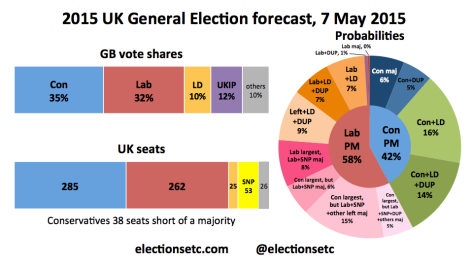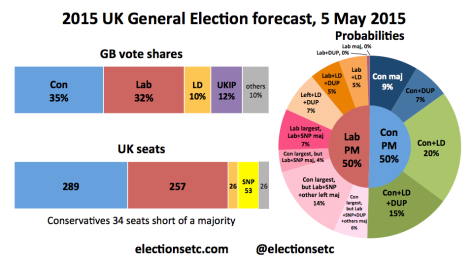By Stephen Fisher
The election outcome was a shocking defeat for Labour and a remarkable victory for the Tories, both relative to expectations from the opinion polls and considering that you have to go back to Salisbury in 1900 to find an instance of a Prime Minister increasing their share of the vote after being in power for more than 18 months. Overall Labour will be just a point up on the abysmal 30% of the GB vote that Gordon Brown achieved in 2010. Moreover Labour are down from 258 seats to 232 (-26).
So how did why did Labour do so badly and how did the Tories manage to increase their vote share and seat tally after five years of cuts and practically zero growth in GNP per person, even if there has been debt stabilisation and some relative good headline growth and jobs figures over the last year? Continue reading How did the Tories win a majority? →
by Stephen Fisher and Zach Ward-Perkins
This blog post counts as work in progress for a more thorough analysis of the issues of political debate and public understanding of macroeconomics. Comments very welcome.
There is a big choice at this election: between austere and austere-er; between cuts and £30bn or so more cuts. Even the so-called anti-austerity SNP turns out, according to the Institute for Fiscal Studies (IFS), to be offering similar spending plans to Labour, just over a longer and slower timescale. Why so? Continue reading The Dysfunctional Debate over Debt, Deficit and Macro Economic Policy →
by Stephen Fisher
This a slightly longer and more detailed version of a post at May2015.com.
David Cameron has argued that a Labour government dependent on SNP support would mean “total chaos”. But the Conservatives are not clear about what they want the voters in Scotland to do about it, and they have failed to mention that coalition-directed voting in England and Wales might be more effective than voting Conservative or Labour. Continue reading Coalition-directed voting comes to Britain? →
By Stephen Fisher
This is an edited version of a piece for The Cherwell.
As with any election, the one on May 7th is about lots of different issues and different things for different people. The factors that will affect the outcome are more numerous and varied still. Nonetheless many commentators are afflicted by a chronic temptation to try to define what particular elections are really all about.
Two main themes stand out this time: the economy and nationalism. The economic contest is between ideological positions on the size and role of the state as well as over competence in macro-economic management. For nationalism the relationships between Scotland and the UK and between the UK and EU are the main issues. Continue reading Links between economics and nationalism at this election →
Election analysis and forecasting



